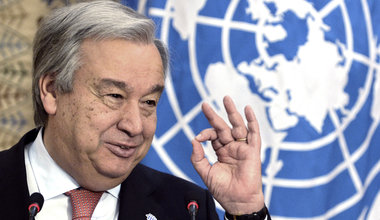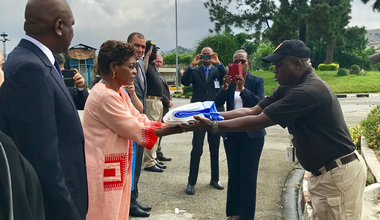UNOCI urges women and youths to become involved in electoral process
Increase the participation of women and young people in the presidential election in 2015. This was the objective of discussions organised by the Human Rights Office of the United Nations Operation in Côte d'Ivoire (UNOCI) in Bouaké on 5 February 2015, with groups from Niakara, Katiola and Dabakala, in the Hambol region, situated at 403 km in the centre north from Abidjan.
UNOCI's Human Rights Officer in Bouaké, Edwige Flora Touali Dansi, said that the initiative aimed at identifying the challenges that women and young people face in becoming more involved in the electoral process and propose solutions which will lead to greater involvement in political life in the Hambol region. « Young people and women do not have to just be responsible for mobilising others or preparing food as has been the custom during election campaigns. They should be solicited for their knowledge and their know-how», she said.
For her part, the president of the Katiola Women's Federation, Nibon Traoré Daouda, believed that the meeting gave women the opportunity to understand their right to be candidates in elections just like men. In this regard, she said she was from now on committed to sensitisating women to stand as candidates during the next elections.
The vice-president of the Youth Coalition for Development of Katiola, Ouattara Ali, said that young people must be conscious of their role in the electoral process so that they can become contribute to the development of Côte d'Ivoire. ''We must give priority to development so that we can create the right conditions for peaceful elections'', he said.
At the end of the discussions, the young people and women idetified several of the challenges they face in terms of their effective participation in the electoral process. These included the fact that society sees them as second class citizens, their lack of financial means, illiteracy and a lack of political training and the absence of identity cards in some cases.
After identifying the numerous challenges they face, participants made recommendations aimed at facilitating their involvement in politics. In this regard, they called for help in helping young people become entrepreneurs, support for women so that they can become financially independent, resuming the public hearings in order to acquire identity cards, strengthen social cohesion and promote reconciliation between local leaders and elected officials in the region; strengthen participants capacity in politics and the involvement of women and young people in the decision-making process.
Some 120 people took part in the focus group discussion hosted by UNOCI, the Civil Society Platform in Katiola and the NGO, Women Living with HIV/AIDS.
 UN
UN United Nations Peacekeeping
United Nations Peacekeeping




